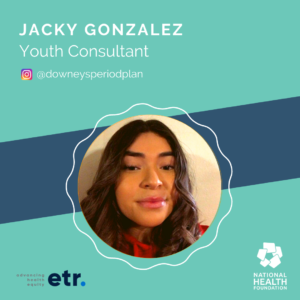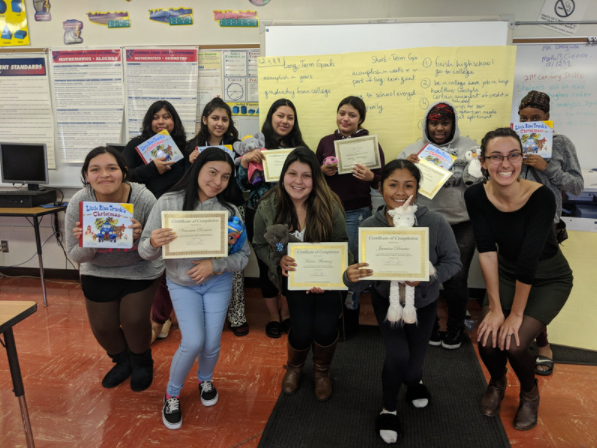
For its first-ever ‘Teen Talk’ and in recognition of September’s Sexual Health Awareness Month, National Health Foundation chatted with Jacky Gonzalez, a youth consultant and participant in NHF’s Be a STAR program and activist for reproductive rights. Through its partnership with ETR, NHF is able to work with trailblazing youth who serve as consultants with the goal of building upon its Be a STAR program. An aspiring youth activist, Gonzalez is a co-founder of Downey’s Period Plan, a grassroots campaign to improve period equity by installing feminine care products in public spaces throughout Downey. Our conversation explores Gonzalez’s experience in the Be a STAR program, the importance of sexual health, and how other young people can get involved in activism.
Tell us a little bit about yourself.
I am currently a senior in high school, hoping to go to college and major in Psychology. My favorite things to do are to workout, journal, and go on night cruises throughout LA.
Describe your experience in the Be a STAR Program. What were the three biggest takeaways for you?
Be a STAR was an eye-opening experience for me. I thought I was educated on topics, but Be a STAR made me more aware about different topics. Three of my biggest takeaways from the program include (1) being aware of your reproductive rights, (2) being respectful to others when it comes to identity or sexual actions, (3) and to not be afraid to ask questions about sexual and reproductive rights.
Tell us about your experience as a Youth Consultant for NHF.
Being a Youth Consultant for NHF was an amazing experience. I absolutely loved being able to bring ideas into the curriculum, knowing that it was being used positively. My favorite part of the program was bouncing ideas with the other Youth Consultants. Our discussions would go on for hours, which definitely motivated all of us to put our best effort into the program.
This month is Sexual Health Awareness Month. What does sexual and reproductive health mean to you and why is it important?
Sexual and reproductive health means having the knowledge to advocate for yourself. Being able to know about your own health and the rights you have for your body allows us to protect ourselves in different ways. Sexual and reproductive health is important to me because at a young age I experienced sexual assault. Back then, I was uneducated about my own body and what I could have done in that particular situation. So, to be able to educate other youth about sexual and reproductive health will allow more teens to be educated about their body and be prepared for almost any situation regarding their body.
Tell us about your activism work currently.
Currently, I am in a group called Downey’s Period Plan where we advocate for period equity in our community. Over the summer, we started reaching out to small, local businesses in our community asking them to place feminine products, such as pads and tampons, into their restrooms. We have been able to reach out to two local businesses to install these feminine products into the restroom. But we are also talking with our local high school to begin filling up the pads dispenser inside the girls restroom.
How and when did your interest in reproductive health and period equity first begin and what sparked that interest?
My interest in reproductive health and period equity started this year. I was in a difficult place mentally in the beginning of the year. My sister had sent me the Be a STAR program flyer and I decided to join the program because I wanted something to look forward to. As the Be a STAR meetings went on, I became more interested and noticed a passion for reproductive health because I was able to connect it back to situations in my own life.
My interest in period equity definitely started from the Be a STAR program and being an NHF Youth Consultant, especially when it came to talking about YPAR (Youth Participatory Action Research) projects. I remember Chad talking about YPAR projects and was sad when we didn’t have enough time to start our own YPAR project. But once I had the chance to start a YPAR project, I jumped onto period equity because it connected to reproductive health, which is where I believe I have the strongest knowledge about.
Do you have any final advice for aspiring youth activists or comments about recent participation in the Be a STAR program?
My advice for aspiring youth activists is to not be afraid to start advocating. As activists, we all need to start somewhere small and then grow. Six months ago, I didn’t think that I would have accomplished what I have with Downey’s Period Plan. I always wanted to see change but was always afraid about where to start. I am grateful that I was able to step out of my comfort zone and be an advocate to educate youth on topics that aren’t shared as much as they should be.
As for Be a STAR, I’m excited for all the new teens who get to learn the curriculum. The Youth Consultants and I put our best effort into making sure that the teens coming into the program get the best information about sexual and reproductive health. I can’t wait to see what the youth are able to accomplish in this program.

To learn more about NHF’s Be a Star program or partnership with ETR, please visit our webpage or contact Chad Monk at cmonk@nhfca.org.
